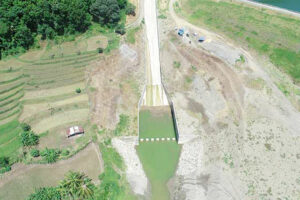THE next administration must ramp up investment in irrigation, starting with the retrofitting of dams to boost their capacity to capture more rainwater, Agriculture Secretary William D. Dar said.
“There are many dams that were put up by the National Irrigation Administration (NIA). The problem at present is not the dams, but the limited capacity. We have too much rainfall during the rainy season. What will happen? It always overflows because we don’t have enough capacity (to keep water in reservoirs). The water is wasted,” he said during a virtual briefing.
“Let’s retrofit the existing irrigation dams so that we put up secondary or tertiary dams down there to collect the overflowing water so it can serve other purposes, like flood control, aquaculture or farm tourism,” he added.
Mr. Dar said 1.1 million hectares of farmland remain unirrigated.
“At the rate our NIA is doing development and construction of irrigation facilities, it will take 40 to 50 years before all that is fixed. The NIA has a (building) capacity of 25,000 hectares annually,” he said.
In April, President Rodrigo R. Duterte signed an executive order transferring the NIA back to the Department of Agriculture (DA).
“There must be a Build, Build, Build program in agriculture. In the next six years, we have to finish these 1.1 million hectares of land,” he added.
Apart from irrigation development, Mr. Dar said that he has listed other policy recommendations for President Ferdinand R. Marcos, Jr. who will be his successor as agriculture secretary.
“Because of limited budgetary support for investment in the sector, growth has been stunted these past years. Because of low productivity and small landholdings, it is also impacting the growth and development of the sector. We need a plan to reboot Philippine agriculture,” he said.
Mr. Dar said that the Agriculture department should promote the balanced fertilization strategy, which will prioritize the use of bio-fertilizers and stimulants.
He also called for an increase in the budget for fuel and fertilizer subsidies.
“(These) policy recommendations would further strengthen existing and new farmers’ cooperatives and associations, and help establish an efficient food value chain and logistics system to stabilize food prices, tame inflation, and more importantly provide farmers and fishers bigger incomes,” he added. — Luisa Maria Jacinta C. Jocson
